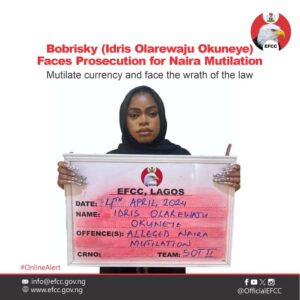Nigeria has long grappled with the offence of Naira abuse, with penalties ranging from fines to imprisonment. The Central Bank of Nigeria’s Act of 2017 prohibits actions like hawking, spraying, squeezing, dancing, or writing on the Naira. Despite these regulations, incidents of abuse have persisted, prompting authorities to take action.
With 36.75 million (16.2%) Nigerians using social media as of January 2024, varied lifestyles are displayed online. Some Nigerians, particularly celebrities and influencers, have made it a culture to display their affluence and spending prowess, even if it means mutilating the naira.
These content have become tools that provide the government with valuable evidence and insights to to enforce existing laws and bring offenders to justice. The Nigerian authorities are already maximising these platforms as the Economic and Financial Crimes Commission (EFCC) has been in the news for its swift action in nabbing a socialite who has been under its raider for a while.
Read also: EFCC to arraign Binance officials for money laundering
Bobrisky’s naira abuse case with EFCC

The arrest of the flamboyant celebrity crossdresser Bobrisky by the EFCC has brought renewed attention to the issue. The crossdresser’s lavish lifestyle, often flaunted on social media, includes videos of him spraying cash at various events, leading to his arrest for alleged naira abuse. His latest stint surfaced on social media, where he was shown spraying naira notes at the premiere of Eniola Ajao’s movie Ajakaju.
“We are very serious about restoring the dignity of the Naira,” stated EFCC spokesperson Dele Oyewale, underscoring the gravity of the situation. Bobrisky’s case has become emblematic of the broader struggle against Naira abuse in Nigeria.
Legal proceedings against the self-acclaimed ‘mummy of Lagos’ have garnered significant public interest, with debates raging on social media platforms. The EFCC’s efforts to uphold the integrity of the Naira through enforcement actions like Bobrisky’s arrest have received both praise and criticism from Nigerians. Some argue that high-profile arrests send a strong message about compliance, while others question the prioritisation of such cases amidst other pressing issues.
Legal Action Against Offenders: Setting a Precedent
Bobrisky is not the only individual facing legal consequences for naira abuse. Actress Oluwadarasimi Omoseyin was sentenced to six months in prison for spraying and stepping on Naira notes at a social event in Lagos. This decision underscores the seriousness with which the judiciary views naira abuse, setting a precedent for future enforcement efforts.
Netizens react as Nubi abuses Naira, and Etiko Handles currency with care.
Pelumi sprayed money and stepped on it, Lagos State Government worships her feet, gave her a house and car and crowned her ambassador of Lagos State. Bobrisky sprays money and steps on it , Lagos State sends her to prison. I condemn Bobrisky ‘s lifestyle pic.twitter.com/XbY89W71df
— Dr Penking™🇳🇬🇦🇺 (@drpenking) April 8, 2024
In another turn of events, an X user, Dr Penking, highlighted an old video of Lagos state’s tourism ambassador, Pelumi Nubi, allegedly abusing Naira notes at a celebration. The video went viral, eliciting strong reactions from social media users. While some criticised Nubi for her actions, others questioned the fairness of enforcement, noting disparities in treatment.
Nigerians await whether or not Lagos state’s newest tourism pride would also be prosecuted.
View this post on Instagram
Meanwhile, it appears EFCC’s naira abuse offenders crackdown is aiding the CBN’s Act of 2017, as footage of Nigerian actress Destiny Etiko handling the Naira with care at a party surfaces online. The actress was seen handing the bride bundles of cash one after the other, instead of the usual act of celebrities raining individual naira notes on celebrants at parties.
Read also: EFCC nabs unlicensed forex dealer over alleged N2 billion fraud in Lagos
Social Media’s Role in Combating Naira Abuse
Naira abuse not only undermines the integrity of the national currency but also poses significant risks to the economy and public health. By leveraging the power of social media, Nigerian authorities are taking decisive steps to enforce existing laws, track down offenders and build robust legal cases to crackdown on offenders and promote financial stability.
This innovative approach highlights the transformative potential of technology in the fight against financial crimes, paving the way for a more secure and resilient economic future in Nigeria.











